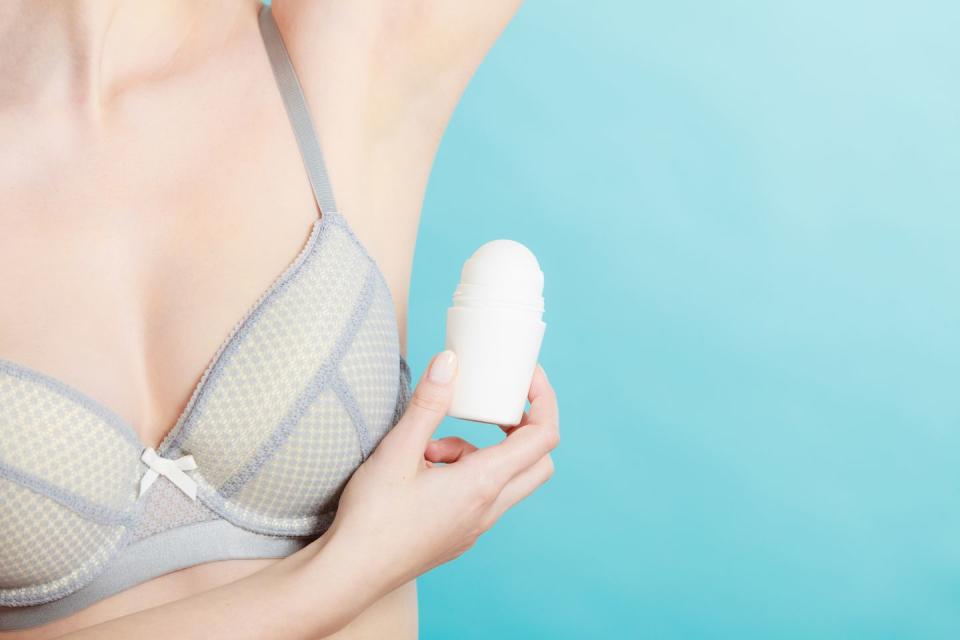Why You Can’t Stop Sweating for No Reason—and How to Make It Stop ASAP

“Hearst Magazines and Verizon Media may earn commission or revenue on some items through the links below.”
We all know that sweaty armpits are sometimes just a part of life. But what happens when your perspiration situation goes from normal to...embarrassing?
Sweating, though kinda gross, is an essential bodily function. “We sweat to regulate our body temperature,” says Corinne Erickson, MD, a dermatologist at Texas Health Presbyterian Hospital Dallas. When your temp rises above the usual 98.6°F, your body tries to bring it back down by releasing sweat from your sweat glands. Once the sweat hits the surface of your skin and starts to evaporate, you feel cooler and more comfortable.
The only real downside? It stinks. Sweat itself is a clear, odorless liquid. But when it mixes with the bacteria on your skin, it can cause a funky odor, according to the National Institutes of Health. Plus, it can soak through your clothes and leave a stain.
It’s true that some people simply sweat more than others. However, if you’re sweating for no reason or in seemingly weird situations (say, when it’s cold out), you might have a medical issue. Here’s what you need to know about excessive sweating and what you can do to keep the stench and wetness under control.
Can your armpits sweat for no reason?
Everyone’s different when it comes to sweat. “Some people just sweat more than others, just like some people run faster than others,” says Osita Onugha, MD, a thoracic surgeon at Providence Saint John’s Health Center’s Hyperhidrosis Program in Santa Monica, California. Heavy perspiration tends to be genetic—so if you have a family member who always seems to be sweating, it’s more likely to be an issue for you as well.
There are other reasons you might sweat a lot. “Fitter people typically start sweating sooner than less fit people to keep the body cooler and maintain physical endurance,” Dr. Erickson says.
However, sweaty doesn’t always equal healthy. Being overweight, drinking too much alcohol, and smoking can all make you sweat more too, she says. You might also sweat more when you have a fever or if you’re going through menopause.
But if you’re constantly soaking through your tops and can’t think of a culprit? You might have an excessive sweating problem called hyperhidrosis, which affects about 5 percent of U.S. adults. “The sweating really affects your ability to perform daily activities,” Dr. Onugha says. “You’ll typically start sweating as soon as you wake up and stop sweating while you sleep.” Sometimes the condition is the result of another health condition—like an overactive thyroid, a nervous system disorder, or low blood sugar but it can also exist on its own, according to the NIH.
Why do your armpits sweat when you’re cold—or even when you have deodorant on?
The body’s fight-or-flight response can activate sweating—so even if you’re cold, you might notice that you sweat when you’re very nervous or stressed. Cold sweating can also strike when you’re sick, or when your blood pressure or blood sugar drop.
Cold sweating could be another clue that you have hyperhidrosis, but it could also be a sign of another condition called cold-induced sweating syndrome, a genetic disorder characterized by problems regulating body temperature, according to the National Library of Medicine. So if you notice you seem to sweat a ton for no reason or frequently sweat when it’s cold, it's a good idea to talk to your doctor.
How to get rid of sweaty armpits

Antiperspirant
To keep sweat at bay, applying an antiperspirant is a good place to start (deodorants only mask sweat's odor—they don't actually stop or prevent you from perspiring). “The aluminum salts in antiperspirants react with sweat to temporarily plug sweat ducts so that sweat can’t be released,” Dr. Erickson explains. Over-the-counter antiperspirants come in varying strengths, including regular, clinical, and prescription (this is simply determined by the amount of aluminum salts used in the formula).
Beyond the prescription-strength options found at the drugstore, like Certain Dri, your doctor can prescribe something even stronger if OTC options aren’t enough, says the American Academy of Dermatology (AAD). Those will get the job done for most heavy sweaters.
Botox
If a prescription sweat stick still isn’t cutting it, there are other options. Botox injections in your armpits can block sweat-stimulating chemicals and ease excessive sweating for up to six months, according to the AAD. For severe cases of hyperhidrosis, you could even opt to have your sweat glands surgically removed, Dr. Onugha says.
Oral medications
Your doctor may also recommend oral medications used to treat excessive sweating. Anticholinergics are the most common, which prevent perspiration-triggering chemical messengers from reaching your sweat glands. However, these medications target your entire body, rather than just your armpits, so side effects may include dry mouth, constipation, blurred version, and more.
miraDry
This FDA-approved procedure actually eliminates the sweat glands in your armpit using electromagnetic energy. No, this doesn’t mean your body will suddenly start overheating. “We have sweat glands all over our body, so getting rid of a few glands in one specific area really doesn’t impact our ability to regulate body temperature,” explains Dee Anna Glaser, MD, founding board member of the International Hyperhidrosis Society previously told Prevention. Even though it is effective, miraDry can be pricey (up to $3,500 with multiple treatments), and it's not typically covered by insurance.
How to hide your sweaty armpits
Concealing wet spots under your pits won’t fix excessive sweating, but it can help you feel less self-conscious until you and your doctor decide on the best treatment plan.
Underarm pads can help keep sweat from soaking through to your clothes where it’s more visible, Dr. Erickson says. (Try Clean Bee Ultra Thin Underarm Sweat Pads.)
Since it’s harder to spot wetness on very dark colors, wearing black or navy tops might also help. Ditto with wearing loose-fitting clothes, which are less likely to come in contact with your skin and absorb sweat.
You Might Also Like

